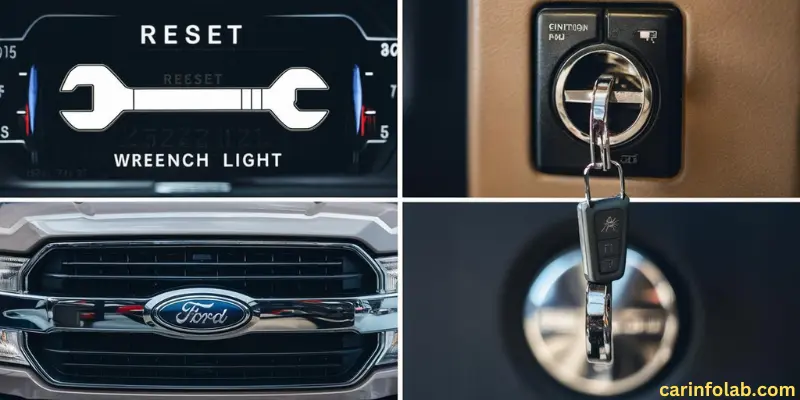Ford F150 Wrench Light On: Common Causes and Solutions
Updated: July 18, 2024
318
When you’re driving your Ford F150 and notice the wrench light illuminated on your dashboard, understanding its causes and solutions can help you navigate potential issues effectively. Ford F150 Wrench Light On is a warning indicator that signals problems within the powertrain or all-wheel-drive system. While it can be concerning, it doesn’t always indicate a major problem.
This article will delve into the common reasons behind the wrench light coming on and provide practical solutions to address each issue. Whether it’s transmission concerns, throttle body issues, suspension, or routine maintenance needs, knowing how to identify and resolve these issues can keep your Ford F150 running smoothly.
What Does The Wrench Light Mean On a Ford f150?
The wrench light in your Ford F150 is a warning indicator. It’s part of the vehicle’s onboard diagnostic system. When this light turns on, it means there’s a problem related to the powertrain or the all-wheel-drive system. The powertrain includes components like the engine, transmission, and driveshafts.

Common Causes of the Ford F150 Wrench Light On
Here are some of the most common reasons the wrench light might come on in your Ford F150:
1. Transmission Issues
- Low transmission fluid
- Faulty transmission sensors
- Transmission overheating
2. Throttle Body Problems
- Dirty throttle body
- Faulty throttle position sensor
3. Electronic Throttle Control System
- Malfunctioning electronic throttle control
- Wiring issues
4. Battery and Alternator Problems
- Weak battery
- Failing alternator
5. Regular Maintenance Required
- Oil change needed
- Air filter replacement
“Had the wrench light come on my F-150 a while back. Took it to the mechanic expecting the worst, but it ended up being a faulty sensor. They replaced it, and I’ve been driving worry-free ever since! Glad I didn’t ignore the light.”John B., F-150 enthusiast
How to Diagnose the Wrench Light On?
Diagnosing the wrench light can be straightforward with the right tools and knowledge. Here’s a simple guide:
1. Check the Owner’s Manual
One of the first steps you should take when the wrench light comes on is to check your owner’s manual. The manual provides valuable information specific to your Ford F150, including details about what the wrench light indicates and any immediate actions you should take. It can guide you through basic troubleshooting steps and help you understand whether the issue is something you can handle yourself or requires professional attention. Always refer to the manual for accurate and vehicle-specific advice.
2. Use an OBD-II Scanner
An OBD-II scanner is a handy tool for diagnosing the wrench light issue in your Ford F150. Plugging this device into your vehicle’s OBD-II port allows you to read error codes that provide specific information about the problem. These codes can help pinpoint the exact cause of the warning light, making it easier to determine the necessary repairs. Using an OBD-II scanner can save you time and money by allowing you to identify and address issues before they become more serious. A professional mechanic can assist you if you’re unfamiliar with this tool.
3. Inspect Fluid Levels
Inspecting fluid levels is crucial when the wrench light comes on in your Ford F150. Low or imbalanced fluid levels, such as engine oil, transmission fluid, and coolant, can trigger the warning light. Regularly checking and maintaining these fluids ensures your vehicle’s components are properly lubricated and cooled, preventing potential damage and costly repairs. Make it a habit to inspect fluid levels periodically and top them off as needed, following the guidelines in your owner’s manual for the correct types and amounts of fluids.
4. Visual Inspection
Performing a visual inspection is a simple yet effective way to identify potential issues when the wrench light comes on. Start by looking under the hood for any signs of trouble, such as loose or damaged wires, leaking fluids, or worn-out components. Check the condition of belts and hoses, as well as the battery connections. A careful visual inspection can often reveal problems that are easy to fix, saving time and preventing more serious issues. If you notice anything unusual, address it promptly or seek professional help.
Solutions for Common Wrench Light Issues
Here’s how you can address the common problems causing the wrench light to turn on:
Solution of Transmission Issues
- Low Transmission Fluid:
- Solution: Add more transmission fluid. Use the type recommended in your owner’s manual.
- Faulty Transmission Sensors:
- Solution: Replace the faulty sensors. This usually requires a mechanic.
- Transmission Overheating:
- Solution: Ensure proper cooling. Check the transmission cooler and clean it if necessary.
Solution of Throttle Body Problems
- Dirty Throttle Body:
- Solution: Clean the throttle body. You can do this using a throttle body cleaner spray.
- Faulty Throttle Position Sensor:
- Solution: Replace the sensor. This may require a mechanic’s help.
Solution of Electronic Throttle Control System
- Malfunctioning Control System:
- Solution: A diagnostic tool can help identify the issue. It might need professional repair.
- Wiring Issues:
- Solution: Check and repair any damaged wires or connectors.
Solution of Battery and Alternator Problems
- Weak Battery:
- Solution: Test the battery. Replace it if it’s weak or failing.
- Failing Alternator:
- Solution: Test the alternator. If it’s not charging the battery properly, replace it.
Solution Regular Maintenance Required
- Oil Change Needed:
- Solution: Change the oil. Regular oil changes are crucial for your vehicle’s health.
- Air Filter Replacement:
- Solution: Replace the air filter. A clean air filter ensures better engine performance.
Preventive Measures to Avoid Ford F150 Wrench Light On
To avoid seeing the wrench light in the future, consider these preventive measures:
| Tips |
|---|
|
Troubleshooting Wrench Light Alerts
| Issue | Cause | Solution |
|---|---|---|
| Transmission Issues | Low fluid, faulty sensors, overheating | Add fluid, replace sensors, ensure cooling |
| Throttle Body Problems | Dirty throttle, faulty sensor | Clean throttle, replace sensor |
| Electronic Throttle Control | Malfunctioning system, wiring issues | Diagnose, repair system, fix wires |
| Battery and Alternator Problems | Weak battery, failing alternator | Test/replace battery, test/replace alternator |
| Regular Maintenance Required | Oil change, air filter replacement | Change oil, replace air filter |
How To Reset Wrench Light On Ford f150?
Resetting the wrench light on a Ford F150 is a straightforward process that you can do yourself. To reset it, turn off your vehicle’s engine and ensure all doors are closed. Next, insert your key into the ignition and turn it to the “on” position without starting the engine. Press and hold the brake pedal for about 10 seconds.

After that, press and release the gas pedal thrice within 10 seconds. Finally, turn off the ignition and start your engine to see if the wrench light has been reset. If it hasn’t, repeat these steps. This method typically works for most Ford F150 models, but consulting your owner’s manual or a professional mechanic can provide further guidance if you encounter any issues.
When to Seek Professional Help for Ford F150 Wrench Light
While some issues can be resolved at home, others might need a professional mechanic’s expertise. Seek professional help if:
- The wrench light stays on even after you’ve tried fixing the issue.
- The problem seems complex or requires special tools.
- You’re unsure about diagnosing or repairing the issue.
Conclusion
When the wrench light comes on in your Ford F150, it can be a bit scary, but it’s often a sign of a fixable problem. Knowing the common reasons, like transmission issues, throttle body problems, and regular maintenance needs, can help you deal with it. Regular check-ups and quick responses to warning signs will keep your truck running smoothly. If you can’t fix the issue yourself, it’s a good idea to visit a mechanic. By staying aware and taking action, you can keep your Ford F150 in good condition and safe to drive.
FAQs
Should I drive with the wrench light on?
It’s not recommended. Ignoring the light could worsen the problem. Proceed cautiously and get it checked as soon as possible.
Can I fix a Ford F150 wrench light myself?
Maybe! Some causes, like a loose gas cap, are simple fixes. For complex issues, consult a mechanic.
How much does it cost to fix a Ford F150 wrench light?
Costs depend on the cause. A simple fix might be inexpensive, while a major repair could be costly.
What are the most common reasons for a Ford F150 wrench light?
Common culprits include low transmission fluid, faulty sensors, or throttle body problems.
Can a bad battery cause the wrench light to come on?
Yes, low battery voltage can trigger the wrench light. Check your battery health.
Please Write Your Comments